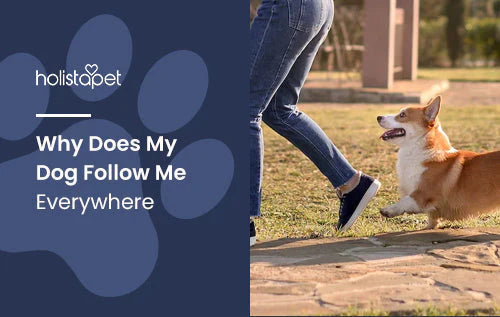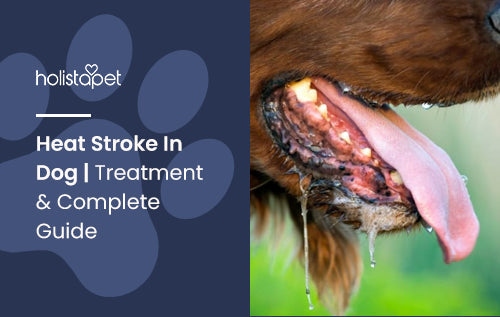Is your dog always by your side — even if you're just in the bathroom or trying to get work done? While it may feel like an invasion of privacy, a dog following you from room to room is often harmless. In fact, it can be endearing knowing how much they love being with you. But sometimes it can seem a little excessive — even concerning. At that point, you might start wondering, "Why does my dog follow me everywhere?"
Why Do Dogs Follow Their Owners?
Even if you're just straightening your hair or shaving your beard, dogs just enjoy spending time with you. That's especially true if you got your dog as a puppy. Your dog may also correlate you getting up — even if it's just to pee or grab a remote control — as you get ready to feed them or walk them.
Dogs are social animals that enjoy being around their family. There are even some breeds that are dispositioned to follow. They're sometimes called a "velcro dog," and they can always be found in the same room as you. Some of these more clingy pups include Labradors, Golden Retrievers, German Shepherds, Pugs, Italian Greyhounds, Lhasa Apso and Poodles.

Is it Normal For Dogs to Follow Their Owners?
The short answer is: Yes. Most dogs enjoy being around you and they want to be wherever you are. Of course, you may notice something a little off with the way your dog follows you around.
Maybe it's accompanied by other worrying behaviors, like aggression, fear, or destructive behavior (like scratching doors when they can't get in or when you leave). Or maybe they're starting to disrupt your daily routines and you can't even make breakfast without your dog standing where you need to walk or putting their paws up on the counter or table to get even closer to the action!
Normal vs. Abnormal Shadowing
If your dog can't seem to stop following you everywhere, it may be heading into "abnormal" territory. While frequently following you is quite normal for a social animal like dogs, it could be part of an underlying issue you may not be aware of if their behavior seems a little off. Here are some things to look for:
- Immediately following you no matter the circumstance
- Walking so close to you that it's hard to even maneuver around the house
- Getting upset, angry, or fearful when they can't follow you
- Avoiding other people or animals while clinging to you
- Scratching at doors when they can't be with you or when you leave the house
- Frequent urination and vomiting when left alone
- Demanding your attention at all times
- Excessive barking whenever your attention is elsewhere
- Lethargic and not interested in other activities
Why Does My Dog Follow Me Everywhere?
Companionship and Attention
You most likely talk to people at work, school, or out in public. You hang out with your friends and family. Or, it's possible you may even chat with new faces at bars! Well, dogs don't really have those options. You are most likely the center of your dog's world so it's no surprise they want to be around you!
Your dog may just love being close to you, whether it's doing errands around the house or going on a jog around the neighborhood. Some dogs need more attention than others. You may notice a particularly clingy dog barking or pawing at you to get attention on top of following you from room to room.
Following Your Lead
Dogs often view one of the humans in their home as the alpha. This is probably the human who feeds them, plays with them, and trains them. If that's you, you may start to notice that your pup follows you around more often than they follow around anyone else.
Separation Anxiety
Maybe your dog just simply does not want you to leave. Your canine may recognize your daily morning routine before work — showering, brushing your teeth, changing, eating breakfast, doing yoga, putting on your shoes. They probably have realized that you leave after you're done with all of those tasks, which is why they follow you around while you do each one of them. Your dog might be getting sad or upset at the thought of you leaving.
Fear and Social Anxiety
It's possible that your dog is only comfortable around you and is simply afraid of everyone — and everything — else. If that's the case, you may notice your dog staying by your side or hovering around you obsessively while you're out at the park or walking through the city. Maybe they also have their tail between their legs or they're shaking a bit. This is an indicator that your dog is uncomfortable and relying on you to feel protected.
Reinforcement
You might not realize it, but you may have accidentally trained your dog to follow you around. Maybe while your dog is walking with you, you have stopped to give them treats or pet them. There's nothing wrong with showing your dog affection, of course! But now they may associate following you around with getting what they want.
Boredom
Your buddy could simply be bored — and you're their source of entertainment! Your dog may think of following you as a new activity that breaks their daily routine. Who knew watching you chop up veggies, lift weights, or play video games could be so fascinating to someone!

How to Stop Your Dog From Following You Everywhere
If They Want More Attention
It's possible that your dog feels a little neglected. Maybe you've been working a lot, taking care of a baby, or doing a big renovation project. Whatever the reason, your dog might feel like they're not getting as much affection as usual. A simple fix could just be showing your doggy some love! Make sure you spend part of your day playing with them, going on walks, and petting them.
If Your Dog Thinks You're the Boss
Since your dog is following your lead, you can most likely train them to stop following you if it's starting to get in the way of your work or daily routine. Instruct your dog to stay and then give them a treat or attention when they don't go to follow you. Try placing a mat where you want them to go when you command them to stay. This may soon become an area they automatically go to when you are going about your tasks in that room.
If They Are Scared of You Leaving
Dogs are pack animals and they love being around other people and animals. For some dogs, it can be traumatic or scary when they're left alone. The American Kennel Club estimates that 14% of dogs in the United States have separation anxiety. A dog experiencing separation anxiety may have destructive behavior. You may also notice frequent urination and vomiting.
If you notice your dog is becoming fearful, stressed, aggressive, or clingy as you go about your morning routine, your dog could have separation anxiety. Try switching up your routine so they no longer associate your activities with you leaving.
You can also provide them with Holistapet's CBD dog treats for anxiety. CBD is a non-psychoactive phytocannabinoid that interacts with your dog's endocannabinoid system (ECS). The ECS helps to balance mood, emotions, and much more. Made with all-natural ingredients, these treats are also infused with Chamomile and L-theanine, promoting alpha wave generation and stress reduction.
RELATED: How to Help a Dog with Separation Anxiety
If They're Scared of Everything Else
Is your dog extra clingy when you're in a public setting, like the park or another house? If your dog also seems anxious, aggressive, or afraid, they could have social anxiety. This is especially common in dogs that weren't socialized properly as puppies.
You may have to slowly get your pup used to social situations before overwhelming them with the sights, smells, and sounds of new people, dogs, or locations. You might want to try our all-organic CBD oil if your dog struggles with social phobias. Try putting drops in their food or on their treats. We have a CBD dose chart for pets here.
RELATED: Dog Social Anxiety: How to End Social Phobias For Good
If You Taught Them to Follow You Around
If your pup is following you around the house, they could simply be expecting a treat or pet from you. While that's not a bad thing, you may want to stop reinforcing this behavior if their shadowing is getting in the way of your everyday life. Start rewarding them for staying instead of following. When they start following you from room to room, simply ignore them. Your dog will start to understand that the attention or food they crave will only come when they stop following you around.
If Your Dog is Bored
If your dog thinks it's interesting to watch you floss your teeth, your dog might be plain old bored. Your buddy might need more stimulation. That could be in the form of toys or puzzles. You can also try training them when you have time or letting them run around in the backyard (if you have a fence or lead). You'll start to notice your dog follows you around less when they have things to do.
Do I Need to Go to The Vet if My Dog Follows Me Everywhere?
A pup that simply likes to spend time with you most likely doesn't need to see the veterinarian. In most cases, you should be able to train your dog to stay or slowly teach them to give you space. It may be as simple as giving them more attention or more challenging activities to keep them occupied.
If your dog continuously has symptoms of separation or social anxiety, it's important to bring your dog to the vet. Your veterinarian will be able to properly diagnose them. They may also provide you with a plan or prescription to help your dog manage their symptoms. You can also talk with them about CBD products for dogs, as a natural alternative.

Browse More Information About Dogs & How To Care For Them
Final Thoughts
Your dog loves you — and loves spending time with you. But when you can't even use the restroom in peace, you may start wondering, "Why is my dog so clingy?" It's entirely possible you could just have a velcro dog! Remember, it's perfectly normal for dogs to spend time with their owners, hanging out in the same room with them whenever they can. It's nothing to be alarmed about.
Of course, if your dog is starting to get in the way or has other concerning symptoms, it may be time to consult a vet about their obsessive behavior. Luckily, there are a lot of solutions, most of which you can do on your own just by spending more time with your pet!







![Probiotics For Dogs [Soft Chews] - HolistaPet](http://www.holistapet.com/cdn/shop/files/Probiotic-Infographic-1_472d7a29-e30c-435a-9638-1365d8c3a9f9.jpg?v=1725384841&width=104)


























Leave a comment
All comments are moderated before being published.
This site is protected by hCaptcha and the hCaptcha Privacy Policy and Terms of Service apply.